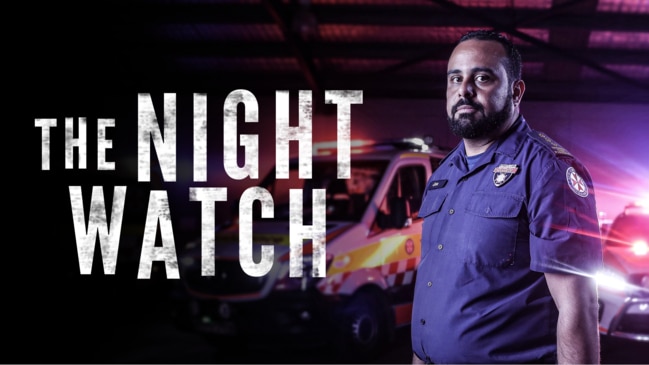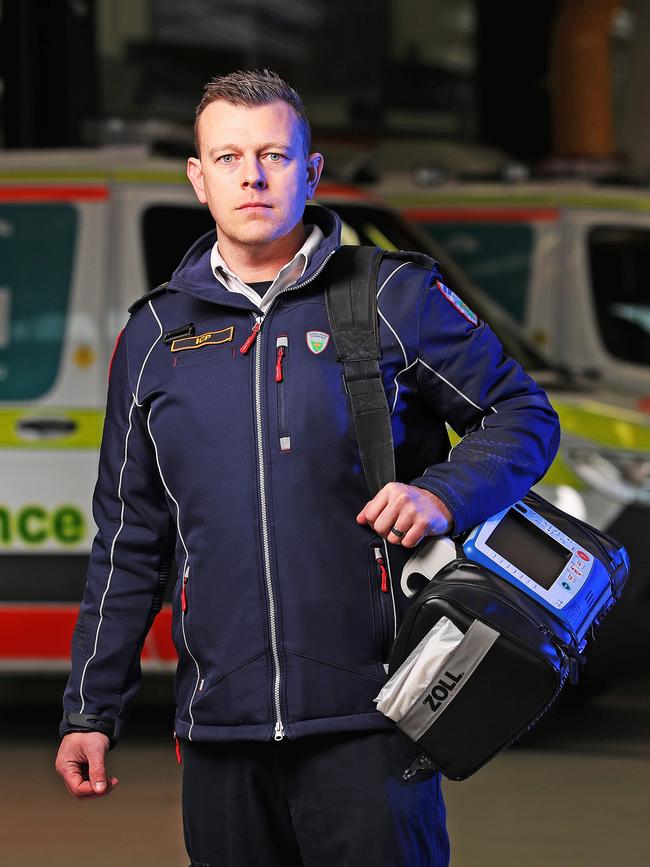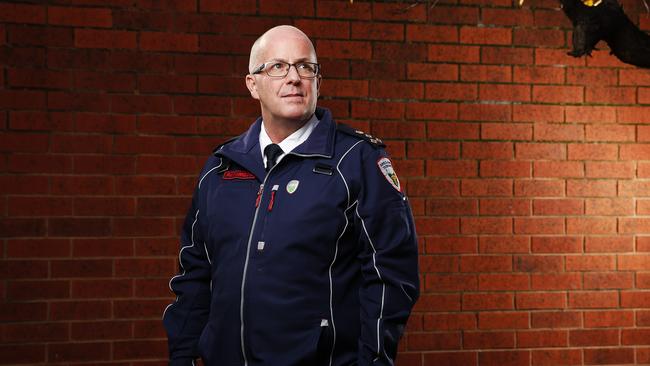The Night Watch: Every day is life and death from Tasmanian paramedic Mal Moss
They are the heroes who keep us safe while we sleep — the night watch. Ahead of a 12-part documentary series, we talk to Mal Moss, a Tasmanian paramedic who loves his job but says some of the things he’s seen will live with him forever. VIDEO AND PODCAST: CHECK OUT THE GRIPPING SERIES

Tasmania
Don't miss out on the headlines from Tasmania. Followed categories will be added to My News.
INTENSIVE care paramedic Mal Moss has been punched, kicked, thrown down an embankment, spat on, threatened with a knife and worse.
Despite that, he describes his job as both the best and easiest in the world.
“It is the easiest thing in the world to turn up and make someone feel better,” Mr Moss said.
“It’s a completing and fulfilling job.
“Having said that, some of the things that we do are the worst things you could think of and the hardest things you could ever think of and they live with you forever,” he said.
Ambulance Tasmania crews respond to about 250 cases every day, which means each crew could be called to up to 10 cases per shift.

While many are routine and non-emergency (“Someone has a leech bite and they think they’re dying,” Mr Moss says), the nature of the job means some cases will affect the lives of the responding paramedics for years to come.
While trauma support was negligible when he started with the ambulance service in Queensland 15 years ago, Mr Moss said he now had no qualms about asking for mental health support to help him deal with particular cases.
As his boss Andrew Porter says, “You cannot un-see the things you have seen” and sharing experiences with colleagues is a vital aspect of life as a paramedic.
“It eats you up inside if you don’t deal with it,” Mr Moss said.
THE NIGHT WATCH SERIES:
The Night Watch: Paramedic Joe Ibrahim on horrific fatal crash in Orchard Hills
The Night Watch: How SA officer Derrick McManus survived being shot 14 times
The Night Watch: How axe-wielding ice addict brought terror to the streets
The Night Watch: Night cops reveal ‘horrific’ frontline reality
An adrenaline junkie who loves working as a paramedic at car races and music festivals, Mr Moss says he is all too aware of the risks he and his crewmates face every shift. Naturally a fast talker, he has often had to talk himself out of danger. In one case he was lured to a location by a false emergency call, only to be set upon by a pair of young men intent on beating him up.
In another he walked into a house where a drug-addled man ran at him with a kitchen knife.
“My wife does get anxious when I go to work, particularly if I’m on a nightshift, but she was a paramedic for over a decade in Queensland and she understands,” Mr Moss said.
He said having children had given him a new perspective and often the jobs that stuck with him were the ones involving kids, such as a child thrown from a car on Christmas Day.
“I didn’t cry about a job until I had children. It gives you another perspective,” Mr Moss said.
A difficult aspect of the job, he said, was the randomness of life and death – the fact he could save someone suffering cardiac arrest one day, but lose a patient the next.
“Sometimes no matter what you do and no matter how hard you work, there’s nothing you can do,” he said.
SOME MEMORIES ARE IMPLANTED SO DEEP THEY WILL NEVER FADE
SOMETIMES an ambulance officer’s memory of a job is so visceral they can recall the smell of the night air or the crunch of dry grass as clearly as the feeling of dread in their stomach.
So says Ambulance Tasmania’s Andrew Porter, who still, many years later, can find himself struck by a sudden pang of recollection, a sharp intake of breath as he remembers a vivid detail.
It is not always the cases you might imagine that stick most in his mind, like the horror car crashes or the brutal assaults, or the drug-fuelled rampages.

The job, he says, is an enormous privilege, which has opened his eyes to the breadth of human experience.
“To some extent we get used to the trauma and other things, but the cases that really touch you are the ones you take with you. That can be both good and bad,” Mr Porter said.
A memory he cannot shake involved a 2am call-out and a mother huddling under blankets on her front lawn, convinced helicopter gunships were coming to bomb her house. It was the woman’s eight-year-old daughter who made the triple-0 call.
“This child had managed to get her and her six-year-old brother to school, with lunches, for three days while her mother was in this state of psychosis before this occurred,” Mr Porter recalled.
Later, in the hospital, he bought the kids some food from the vending machine, having discovered they had not had dinner.
“I remember the eight-year-old saying to her brother ‘Now, what do you say?’ and the little boy has gone ‘Thank you very much’. That level of resilience from those children indicated this wasn’t a one-off,” he said.
“I found myself thinking a lot about what life looked like for those two children and what life would look like into the future. I still find myself thinking about what might have happened to them.”
Mr Porter said an ambulance officer’s first role was to “create order out of chaos”.
He is now southern regional manager and therefore mostly in the office, but for decades Mr Porter worked as a paramedic in Tasmania and South Australia.
He started at the tail end of Australia’s heroin epidemic and says drug use is the thing that has most changed society — and the job of paramedics — during his career.
“In my early years we could go into any scene and our uniform in a way was a coat of protective armour,” Mr Porter said.
“That doesn’t apply now and that is a pretty significant change … with amphetamines we now see what we call ‘the angry man’, that person who has the superhuman strength who you can’t reason with, who is just completely scary.”


